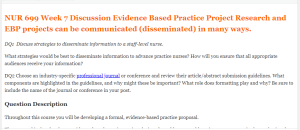DQ1 . Discuss strategies to disseminate information to a staff-level nurse.
DQ1 . Discuss strategies to disseminate information to a staff-level nurse.
What strategies would be best to disseminate information to advance practice nurses? How will you ensure that all appropriate audiences receive your information?
Background
The aim of this systematic literature review was to assess what dissemination strategies are feasible to inform and educate patients about recommendations (also known as guidelines).
Methods
The search was performed in February 2016 in PubMed, Ebsco/PsycINFO, Ebsco/CINAHL and Embase. Studies evaluating dissemination strategies, involving patients and/or reaching patients, were included. A hand search and a search in the grey literature, also done in February 2016, were added. Searches were not restricted by language or publication type.
Publications that referred to (1) guideline(s) or recommendation(s), (2) dissemination, (3) dissemination with patients/patient organisations and (4) dissemination to patients/patient organisations were included in this article. Criteria 1 AND 2 were mandatory together with criteria 3 OR 4.
Results
The initial search revealed 3753 unique publications. Forty-seven articles met the inclusion criteria and were selected for detailed review. The hand search and grey literature resulted in four relevant articles. After reading the full text of the 47 articles, 21 were relevant for answering our research question. Most publications had low levels of evidence, 3 or 4 of the Oxford levels of evidence. One article had a level of evidence of 2(b).
This article gives an overview of tools and strategies to disseminate recommendations to patients. Key factors of success were a dissemination plan, written at the start of the recommendation development process, involvement of patients in this development process and the use of a combination of traditional and innovative dissemination tools. The lack of strong evidence calls for more research of the effectiveness of different dissemination strategies as well as the barriers for implementing a strategic approach of dissemination.
Conclusion

Our findings provide the first systematic overview of tools and strategies to disseminate recommendations to patients and patient organisations. Participation of patients in the whole process is one of the most important findings. These findings are relevant to develop, implement and evaluate more (effective) dissemination strategies which can improve health care.
Electronic supplementary material
The online version of this article (doi:10.1186/s13012-016-0447-x) contains supplementary material, which is available to authorized users.
Keywords: Systematic literature review, Dissemination, Guideline(s), Recommendation(s), Patient(s), Patient organisation(s), Involvement
DQ1 . Discuss strategies to disseminate information to a staff-level nurse. Grading Rubric Guidelines
| Performance Category | 10 | 9 | 8 | 4 | 0 |
| Scholarliness
Demonstrates achievement of scholarly inquiry for professional and academic decisions. |
|
|
|
|
|
| Performance Category | 10 | 9 | 8 | 4 | 0 |
| Application of Course Knowledge –
Demonstrate the ability to analyze, synthesize, and/or apply principles and concepts learned in the course lesson and outside readings and relate them to real-life professional situations |
|
|
|
|
|
| Performance Category | 5 | 4 | 3 | 2 | 0 |
| Interactive Dialogue
Replies to each graded thread topic posted by the course instructor, by Wednesday, 11:59 p.m. MT, of each week, and posts a minimum of two times in each graded thread, on separate days. (5 points possible per graded thread) |
|
Summarizes what was learned from the lesson, readings, and other student posts for the week. |
|
|
|
| Minus 1 Point | Minus 2 Point | Minus 3 Point | Minus 4 Point | Minus 5 Point | |
| Grammar, Syntax, APA
Note: if there are only a few errors in these criteria, please note this for the student in as an area for improvement. If the student does not make the needed corrections in upcoming weeks, then points should be deducted. Points deducted for improper grammar, syntax and APA style of writing. The source of information is the APA Manual 6th Edition |
|
|
|
|
|
| 0 points lost | -5 points lost | ||||
| Total Participation Requirements
per discussion thread |
The student answers the threaded discussion question or topic on one day and posts a second response on another day. | The student does not meet the minimum requirement of two postings on two different days | |||
| Early Participation Requirement
per discussion thread |
The student must provide a substantive answer to the graded discussion question(s) or topic(s), posted by the course instructor (not a response to a peer), by Wednesday, 11:59 p.m. MT of each week. | The student does not meet the requirement of a substantive response to the stated question or topic by Wednesday at 11:59 pm MT. |

